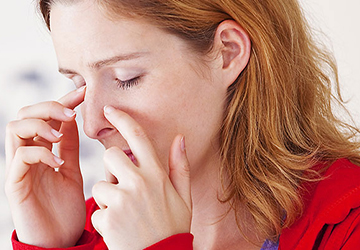There is a lot of discussion about mental illness. People with mental illness often suffer in silence. Many people don't even realize it's a mental health problem, causing them to suffer from other health problems. However, some of the symptoms associated with the various forms of these disorders are often not mentioned when discussing mental illness. People with mental illness often experience physical symptoms as well.
These physical symptoms should never be ignored. Chronic health problems can sometimes be at the root of mental health problems. Research shows that mental illness can manifest in a variety of ways. These include behavioral changes, such as poor diet or risk-taking behavior, which can affect a person's overall health and lead to complications and even a shortened life expectancy. Here are 14 common mental illness symptoms to consider.
1. Obesity
There are many reasons why a person becomes obese. The obvious explanation lies in poor eating habits. However, many people with mental illness also end up obese. Research shows that people with severe mental conditions, such as schizophrenia or bipolar disorder, are at greater risk of gaining weight. People with these mental illnesses may have a BMI over 30.
People with schizophrenia are 3.5 times more likely to be obese. People with bipolar disorder are 1.5 times more likely to be obese. This problem is due to lifestyle choices. Depressed people tend to exercise less and often eat more. Also some medications are available to treat these conditions, but they can also cause weight gain.

2. Fatigue
Feeling tired is something almost everyone experiences. However, "fatigue" is another matter. When a person is tired, they lack motivation to do something. People with symptoms of fatigue may never feel like they are fully rested, no matter how much sleep they get. Fatigue is a common symptom of many different illnesses, including mental illness.
Mental illness is more than just feelings of hopelessness or sadness. These mental disorders can cause a person to have difficulty sleeping, resulting in lower energy levels. Insomnia can make you feel more tired. Chronic fatigue syndrome and depression are often mistakenly confused. However, the two disorders can co-occur. Sometimes, one can lead to the other. If you experience severe fatigue, it's essential to identify the root cause. The cause may be a mental health problem or other underlying health problems.
3. Chronic Pain
Everyone experiences pain from time to time. Some people are in pain all the time. People with chronic pain may see it as a sign of aging, poor sleep, or other causes. However, chronic pain is a common symptom in people with mental illness. Constant pain can cause a person to become depressed. These sad feelings often make the pain worse.
The bottom line is that a wounded mind often needs the same type of healing as a wounded body. According to Harvard Medical School, people with chronic pain are three times more likely to develop mental health problems. People with depression are three times more likely to suffer from chronic pain. It is a symptom that affects both mental and physical health.
4. Twitch
A tic is a controlled response to the urge to contract a muscle. A tic is usually an involuntary spasm. People with mental illness often experience tics or tics. This jerk can be as slight as tapping a finger or toe or as large as shaking your entire leg. Sometimes when a person experiences tics or tics, they may think there is a bigger problem.
Such thoughts can make a person feel anxious and insecure, leading to further mental health problems. Twitches are a sign of anxiety, but in some cases, they can also be a sign of nerve damage or multiple sclerosis. If you have frequent seizures and trouble controlling the spasms, discussing this with your doctor is essential.
5. Sinus problems
Many health conditions can cause a person to develop sinus problems. A cold can cause problems with a person's nose. However, a study conducted by Psychology Today showed that chronic sinus problems are linked to depression. Nearly a quarter of people with chronic sinusitis also suffer from depression.
Sinusitis can be annoying because you feel like you can't breathe properly. People with sinusitis may feel constantly congested and have pressure on the facial area. In the case of mental illness, people with depression may also experience sinus symptoms, as mental health issues trigger physical responses. This can add to feelings of sadness and make the condition even more challenging to cope with.
6. Nausea
Nausea can be a sign of many different types of illness. Anything from eating something you don't like to take a particular drug can make you feel sick. What many people don't realize, however, is that feeling sick to your stomach could be a sign that your brain isn't working at its best. People who often think ill seek treatment for gastrointestinal disorders.
In some cases, there may be an underlying physical problem causing the onset of the disorder. However, it is also a good idea to screen for depression or anxiety before undergoing harsh treatment for a gastrointestinal disease. Stomach problems are common in many people with this type of mental illness. Nausea is a symptom of a mental health problem, and once the proper treatment is found, people may find that they no longer feel sick.
7. Lose weight
Obesity is common among people with mental health problems. In this regard, however, people with specific mental health issues can also lose weight. Some people with depression and anxiety lose weight without really trying. This happens because people who suffer from anxiety or depression often lose interest in things they used to enjoy. Eating is also part of this loss of fun.
Depression disrupts hormones in the body. These hormones tell us when we are full and when we are hungry. When this system is disrupted, it may cause a person to stop eating for some time or to only eat once in a while. If you lose weight without trying or don't have an appetite, talk to your doctor to find out the underlying cause.
8. Headache
Another symptom that psychopaths may experience is headaches. Of course, many different medical conditions can cause a person to have a headache. Simple dehydration is one of the leading causes of headaches. There are other reasons a person may have a headache. However, people with mental illness often experience frequent headaches.
Some mental disorders cause reduced activity of enzymes responsible for deactivating chemicals in the brain. People with depression and anxiety often report that they have frequent headaches. Headaches are usually severe and can last for days at a time. A proper diagnosis can help relieve some of the pain associated with these headaches. So if you have frequent headaches, be sure to consult your doctor.

9. Skin irritation
A study conducted in Norway found a link between eczema and depression and lower levels of omega-3 fatty acids. One of the reasons people with depression may also suffer from skin conditions like eczema is that these mental illnesses can increase stress. When a person is stressed, the body releases cortisol. Cortisol is a hormone that can cause the skin to produce more oil.
When the skin produces more oil, it can lead to rashes and other skin conditions. If you notice a rash on your skin, discussing it with your doctor is essential. A rash can occur for many reasons, one of which is that you have a mental illness. Discussing your condition with your doctor is the best way to determine the cause of your rash and any other symptoms you may be experiencing.
10. Tooth decay
This has been linked to psychological problems and tooth decay. Depression, one of the most common mental illnesses, can lead to tooth decay in people. The main reason for this is that people with depression often lose interest in the basic needs of daily life.
This means a person may not be brushing as often as they should because they don't have the energy or the will to do so. It comes down to them not caring about their well-being.
Some medications commonly used to treat mental illness may also cause gum disease, dry mouth, and tooth decay. People who take antidepressants and other medicines for mental disorders must practice good oral hygiene because these medications can lead to tooth decay and other dental problems.
11. Adrenaline Rush
Anxiety attacks can be horrible. During an anxiety attack, a person often becomes restless. However, the physical aspects of these types of attacks can be pretty scary. A person with an anxiety disorder may have trouble breathing, feel hot or cold, or be unable to control their body.
When the body becomes anxious, adrenaline is released. When too much adrenaline is in the body, the flight or fight response is activated. The adrenaline rush causes a racing heart, shortness of breath, and tense muscles.
Everyone responds to an adrenaline rush differently and for different reasons. If you frequently suffer from these types of seizures, it's essential to seek appropriate treatment to help relieve some of the symptoms you're experiencing. Knowing your psychological triggers can be helpful.
12. Jaw Pain
People with mental illness may experience body pain. One thing that many people with mental illness experience is jaw pain. People with mental illness often develop temporomandibular joint disorder or TMJ disorder.
One reason is that people with mental illness are more likely to clench their teeth or grind their teeth. Either of these actions will cause the jaw muscles to tighten. When the jaw is clenched frequently, the muscles tighten, which can cause pain.
Also, the extra activity your jaw experiences during this time can cause inflammation in the area. A person may develop TMJ disease for other reasons, but a mental illness often accompanies the condition.
13. Sweating
If you exercise or go outside on a hot day, expect to sweat a lot. However, sometimes a person sweats seemingly for no reason. Excessive or unexplained sweating has been linked to mental illness. People who sweat a lot are more likely to suffer from depression, anxiety, or other mental illnesses, according to a study by the University of British Columbia.
It's worth noting that it's unclear whether sweating is due to mental illness or physical symptoms that trigger anxiety or depression. Controlling excessive sweating is unlikely to help you overcome your mental health issues. However, if your sanity returns to normal, you may be able to overcome excessive and unexplained sweating.
14. Swelling
Swelling is a relatively common symptom of many problems. Your ankle may swell after twisting on steps. After a fall, your knee may swell. However, people with mental illness may notice swelling in their legs or arms for no apparent reason. One reason for this is that people with mental illness tend to focus too much on their bodies. You'll notice every tiny change in her body.
You may notice swelling in certain parts of your body if you have a mental illness. Also, people with anxiety disorders may find that their mental state is the cause of the swelling. Anxiety can cause swelling in the joints and liver. This is often associated with physical coercion. Whenever you notice swelling in your body, it's essential to elevate that area. It is also important to discuss this symptom with your doctor.